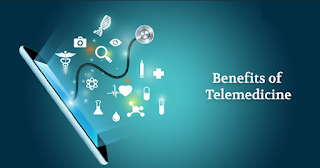Benefits of Telemedicine
What are the Benefits of Telemedicine?
Telemedicine are becoming
increasingly apparent to medical practitioners in many different medical specialties. Benefits of Telemedicine allow patients to interact with their physicians even when they are away from the
office. Physicians can instantly obtain data on patients' physical condition and prepare
appropriate treatment plans for them.
In addition, telemedicine allows patients to see the doctor
at their convenience and to track their records and progress through the use of patient recall
systems.
As more healthcare providers
use telemedicine to improve
patient care, the field of
medicine is becoming
increasingly connected with
technology.
Currently there are
only limited empirical studies on
the clinical impact and cost effectivity of most current
telemedicining applications. This
overview is based primarily on
anecdotal evidence, opinions
and expectations from physicians who use telemedicine to provide primary care to patients.
Most potential https://thetechjournal.in/blog/telemedicine---what-is-it-what-are-its-benefits- are
expected to be realized within the next few years:
Improved access to medical information. There are a number of medical specialties that have
experienced a marked benefit in terms of increased patient satisfaction due to telemedicining.
Benefits of Telemedicines allow patients and healthcare providers to exchange information quickly and
efficiently, which allows the care provider to provide effective care without delay. In addition,
most telemedicine systems are equipped to provide comprehensive reports on patient care and
outcomes at regular intervals. Telemedics also allow for prompt follow-up by patients and their
healthcare providers in the event of problems or other concerns.
Delayed in-person office visits. The primary advantage of telemedics is the decreased time
spent between office visits. Telemedicines allow physicians and patients to meet on the
telephone or via computer applications in minutes rather than hours or days. The decreased
time spent between office visits eliminates the need for physicians and staff to make scheduled
in-person office visits. This is important in light of the rising costs of office visits, which can
sometimes mount up to $100 per hour, depending upon the patient's visit.
Improved patient care. The increased convenience and availability of telemedicine have
improved patient care quality. Patients receive scheduled and predictable in-office visits, which
reduce the occurrence of scheduling or non-scheduled breaks.
This reduces unnecessary trips
to the emergency room, and increases the likelihood of timely treatment and resolution of
healthcare issues. In addition, because telemedicining services often include access to on-site
specialists, more patients to receive treatment for conditions that might not be treated effectively
in the office.
Improved patient engagement and fewer emergency room visits. When a patient is able to visit a
physician in a timely fashion, he or she is more likely to be able to engage the healthcare
provider and feel more comfortable. When patients are satisfied with their visits, they often
require fewer healthcare services, which improves the overall efficiency of the health care
system. In addition, a patient who feels comfortable enough to discuss any health issue with his
or her healthcare provider is more likely to follow recommended treatment recommendations and
recover from illness or injury more quickly.
Telemedicines allow providers to provide
personalized care, and allow patients to view their own charts at a time that is convenient for
them.
Better access to medical professionals. The improved access allows primary care physicians to
treat patients more effectively and access the latest medications and medical advancements.
Telemedicines allow primary care physicians to collaborate with specialty physicians and obtain
timely information about the condition of their patients. This allows patients to receive the best
possible care, which improves their health outcomes.
Ease of access and use. Many healthcare service providers are now able to use sophisticated
electronic patient information management systems.
Telemedicines allow patients to view their
records and charts remotely via a computer, tablet computer, smart phone, Blackberry or other
mobile device. When patients can view their records and charts easily on their preferred device,
they are more likely to follow their doctor's orders and get the medical treatment they require.
When physicians can use their computer to access patient information from any location, they
are better able to provide their patients with high quality care.
For amazing Technology Blogs visit - The Tech Journal.
For Details on "why we need cybersecurity" visit - The Tech Journal



Comments
Post a Comment